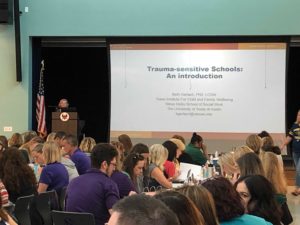Back to School Spotlight: Trauma-Sensitivity and Restorative Discipline
How a Texas School District is implementing the latest research to use restorative discipline and better support the needs of its at-risk students
By Allie Long
 Although there were no students in sight, in early August the halls of Success High School were abuzz with laughter, hugs, and excited chatter. On August first, over 140 school counselors from all over Round Rock Independent School District came together for their annual back to school “Job-Alike” training.
Although there were no students in sight, in early August the halls of Success High School were abuzz with laughter, hugs, and excited chatter. On August first, over 140 school counselors from all over Round Rock Independent School District came together for their annual back to school “Job-Alike” training.
During this eight hour session, counseling teams from across the district learned more about the latest research and practices to best help their students during this new school year. In one of the first sessions of the day, Beth Gerlach, Ph.D., LCSW, Associate Director of TXICFW, gave a presentation on the importance of trauma-sensitive schools.
Beth began her presentation with a “spoiler alert,” sharing the four most important things to know about trauma-sensitive schools. First, that experiences with trauma are much more common than generally understood – for students, parents, teachers and administrators. Second, that a history of trauma can impact behavior at school, especially when a student, parent or teacher perceives a threat. Next, that healing and recovery are always possible and takes place in authentic relationships that build trust. And, finally, that environments that support kids and adults with trauma histories are great learning environments for all.
“Not that long ago, it was common to think that you just got over bad things that happened to you in childhood, but the more we’re learning about the neurobiology of trauma, the more we realize that this often isn’t true,” Beth said. “Healing and resiliency don’t happen on their own outside of trusting and authentic relationships.”

When children experience extremely stressful events (otherwise known as Adverse Childhood Experiences, or ACEs) these events have the power to alter development, and physical and mental health. Furthermore, if these stressors are prolonged without the presence of supportive relationships, a child’s stress level can quickly become toxic and chronic. So when a student acts out in school, they may be doing so because their bodies are on high alert; perceiving threats that may not be apparent to others.
Practices that support children and adults that have experienced trauma go hand in hand with those that support restorative practices. In the simplest terms, schools that support both trauma-sensitive and restorative discipline practices focus on a relational approach to building a safe and respectful school climate while addressing individual student behavior and needs.
“It’s normal for us to feel threatened when students are having big or unanticipated stress response at school, but this can make the situation escalate. Helping kids calm their highly sensitized reaction is key,” Beth shared with the counselors. “In these situations, it’s important to take a breath, slow down and stay connected. This is not the time to exert power and give consequences. Remember that it can be very isolating and scary for a child to feel out of control. We don’t know everyone’s trauma history, so ask yourself: what does this student need in order to feel safe? Once they’ve calmed down, then you can talk about what happened and what needs to happen next time.”
This message took on an extra level of poignancy while sitting in the auditorium at this particular school.
Built in 2014, Success High School’s mission is to provide at-risk students with an opportunity to attain a high school diploma through non-traditional programming. At this school and many others in Round Rock ISD, students are being provided with holistic settings that address their needs academically, emotionally, and socially.
Everything about the morning rang with an air of optimism, including the building itself. Large airy windows from the tops of the vaulted ceilings allowed for an abundance of natural light. The bathroom mirrors were emblazoned with the word “Graduate” above every individual sink, which was impossible not to notice as you went to wash your hands. It felt like a place that was cared for, and that it, in turn, cared of those in its community.
It was in these actions and intentions, both with the school and the counselors inside of it, that the positive ripple effect behind building meaningful connections in schools could be felt. “By being part of a child’s relational support network, you become a key part in changing the conversation for the better,” said Beth. “It becomes the difference between ‘you’ll do what I say because I’m the adult,’ and ‘you’ll do what I say because we have a relationship that matters to you.’”
To learn more about Beth’s trainings on ACEs and resiliency in schools, click here.
